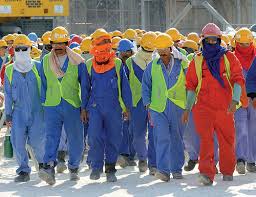By Andrew Warshaw
May 14 – Qatar authorities have made the most forceful pledge to date that they will scrap part of the country’s medieval kafala employment system that has caused so much outrage directed at the 2022 World Cup hosts – but stopped short of abolishing it completely.
At a much heralded press conference in Doha, officials from the Ministry of Interior and Ministry of Labour and Social Affairs released what they termed “wide-ranging labour market reforms.”
Under the new rules a Qatari employer would have to show “compelling” proof of any objection to a worker leaving the country. Disputes would be resolved within three days.
Employees who sign a fixed-term contract would be free to transfer to a new employer at the end of their contract. However, those who sign an indefinite contract would have to work for their employer for five years before being allowed to change positions, according to local Doha reports. If foreign workers want to change jobs earlier, they would still need the permission of their employer.
Other key points of the reform package include:
· Increasing the fines for confiscating a worker’s travel documents
· Distributing a “model contract” that employers must follow in principle when drafting employment agreements;
· Requiring wages to be paid electronically to ensure wages are deposited into a worker’s bank account on time;
· Enforcing a new accommodation standard for workers’ housing.
“We want to provide more protection to the expat community and (all) workers in this country, to provide them with more protection and safeguard their rights,” said Salih Saeed Al-Sahwi, MOLSA’s manager of labour relations.
Implementation and timing of the reforms remain unclear but Colonel Abdullah Saqr al-Mohannadi, human rights director of the Qatari interior ministry, said kafala will now be “replaced by a contractual relationship between employer and employee.”
The reforms are based on recommendations by the London-based law firm DLA Piper, who were hastily commissioned by the Qatari government to review labour laws following widespread reports of atrocious human rights abuses highlighted first by Amnesty International and The Guardian newspaper.
Wednesday’s announcement was the latest indication that the Qataris are keen to improve an image badly tarnished by revelations of scores of deaths among migrant workers and appalling working conditions even though 2022 officials are keen to stress no employees on World Cup sites have lost their lives.
No sooner had the reforms been announced than FIFA president Sepp Blatter and the executive committee colleague he put in charge of monitoring conditions in Qatar, Theo Zwanziger, postponed a scheduled visit to the Gulf state to inspect facilities at first hand.
In FIFA’s formal statement, Blatter described the announcement as “a significant step in the right direction for sustainable change in the workers’ welfare standards in Qatar.”
He added: “We look forward to seeing the implementation of these concrete actions over the next months. We will continue our close cooperation with Qatari authorities as well as dialogue with all key stakeholders.”
But human rights organisations said the reforms did not go far enough with Amnesty International describing them as a “missed opportunity” and the International Trade Union Confederation calling them “cosmetic” without the necessary guarantees or a proper time frame, pointing out too that Qatar’s notorious exit visas will remain in place with the Interior Ministry now deciding who can and can’t leave the country.
Contact the writer of this story at moc.l1744829907labto1744829907ofdlr1744829907owedi1744829907sni@w1744829907ahsra1744829907w.wer1744829907dna1744829907

